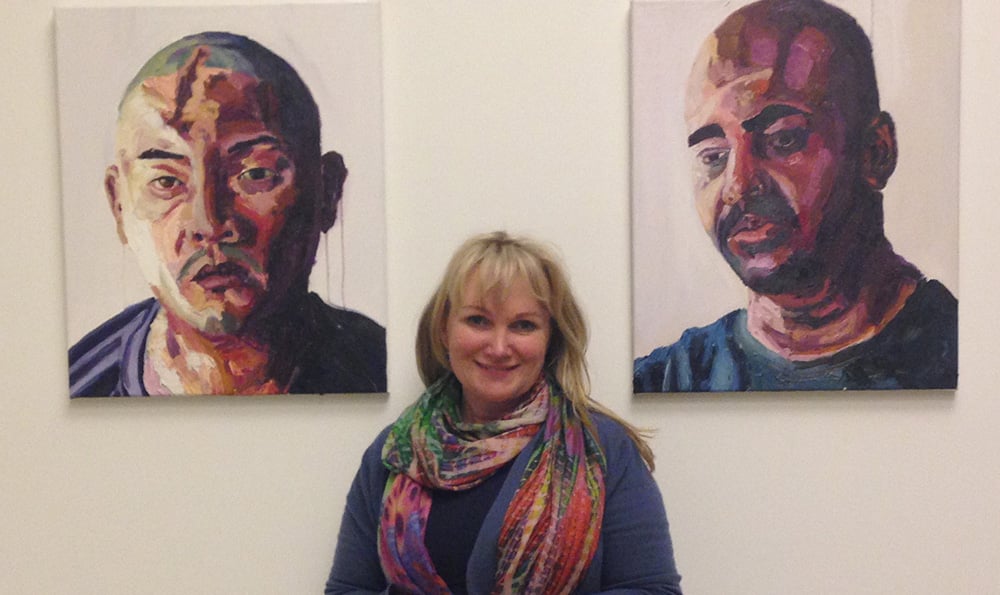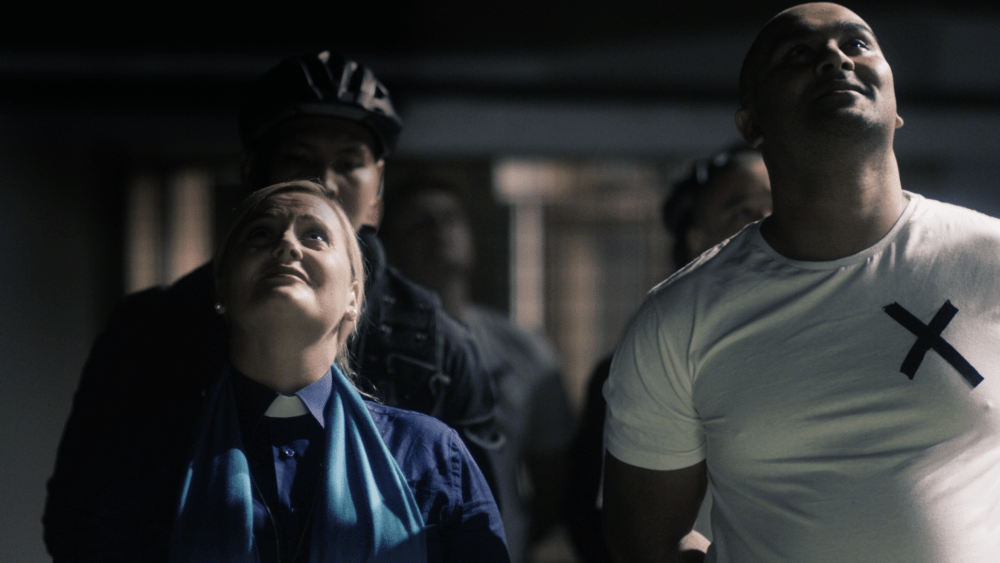A powerful re-creation of the last hours of a convicted drug trafficker is set to stir emotions and spark theological debate in our church communities.
Execution Island is a moving 12-minute film dramatisation of the experience of Melbourne pastor Christie Buckingham as she walked with Bali 9 member Myuran Sukumaran during his last night on Nusakambangan Island, Indonesia, four years ago.
We see the actor playing Christie, Cathie Burnside, give Myuran (played by Rajan Narayan) a final communion and tell him he’s going to do something remarkable that night – see his Creator. Then Myu and the other prisoners start singing Bless the Lord, Oh My Soul as they are led out in chains wearing T-shirts with a cross on the heart.
As the downcast guards apologetically tie up Myuran, he forgives them, then declares a blessing on Indonesia and makes his last words “Jesus, I trust in you”, creating holiness amid the horror.
Heritage Films is releasing Execution Island from April 28 for churches to screen to their local communities. It will come with a study guide and will be available for small groups as well as on iTunes at a later date.
During their nine years in Kerobokan Prison in Bali, Myuran and fellow Australian drug smuggler Andrew Chan were rehabilitated and began many positive activities such as mentoring other prisoners and helping to teach English. Myuran became an accomplished artist while Andrew became an ordained minister and established a church inside the prison.
“Both of them gave me the same values, which were courage, kindness, compassion and forgiveness.” – Christie Buckingham
In providing spiritual counsel to Myuran and Andrew in the lead-up to their execution, Christie challenged them to live and die according to their values.
“It was interesting that both of them gave me the same values, which were courage, kindness, compassion and forgiveness, and I said ‘you can live and you can die according to those things’ – and they did; they showed those things right up to the very end.
“Andrew’s last words were: ‘I love you, Mrs B, I’ll see you on the other side.’”

Christie Buckingham with portraits of Andrew Chan and Myuran Sukumaran.
She recalls that on the night of the execution, she went through the Bible from Genesis to Revelation with Myuran, talking about the redemptive power of God.
“I led him through the Romans road … because that’s what he wanted to do,” she says. “There was no question [about his faith]. This had been a journey of conversations I’ve had with him and the questions he asked, honestly, I’d just be thrilled to have somebody ask those questions,” she says
“It was just very, very powerful and I remember preparing him because I know that when someone gets shot there is about 30 seconds of time – assuming they hit the heart – where their brain has to close down; and I remember saying, ‘in that moment, Myu, if you sense anything, call on the name of the Lord, just call on Jesus.’
“And he made me promise – because if he didn’t die immediately the spiritual advisers would have to go and be there for them to call the shot to hit them in the head – and he said ‘please don’t leave me, make sure you call it.’”
“There’s actually 50 shades of – not grey but 50 shades of grace.” – Christie Buckingham
Christie said she expected the film to prompt Christians to interrogate the faith they had grown up with, which was often based on fear.
“People don’t see that this is actually the crux of the gospel – either Jesus died for the sins of the world or he didn’t, and either his sacrifice was enough, or it wasn’t – we have to do something more. Everyone is redeemable in Christ; and people don’t want to have these conversations, they want to have things black and white when there’s actually 50 shades of – not grey but 50 shades of grace. And they don’t want to interrogate their thoughts because it means they have to change their opinions and change the way they think and change their theology,” she says.
“I see that people’s faith is often outcome based rather than relationship based. That concerns me because I think, sometimes, we’re not preparing people. If God doesn’t do what they want, do they still trust him, is he still enough?
“Could we honestly go totally free, singing the praises of God, to our deaths?”- Christie Buckingham
“The outcome might not be what we had hoped – and I would hope that people would see their lives under the wings of God’s plan for them as opposed to they set off with their great plan and then get disappointed when God doesn’t come with them.
“We really need to say to ourselves how would we be faced with that situation? Could we honestly go totally free, singing the praises of God, to our deaths?”
It was reading an article about Christie detailing intimate moments of her counselling of Myuran that gave executive producer Julian York the idea for the film.
“I was really struggling with life, and testing my faith … Their story, and how they were singing worship songs to their cross, was a real perspective changer for me. I really had a distinct sense that we should tell this story,” he said.
“The fact that this film was made is a miracle and a testament to God’s provision.” – Julian York
The film was a faith project and Julian struggled to get it off the ground financially. It took two years to raise $5000. Their insurance fell through the day before filming and two weeks before shooting began they still didn’t have a cast.
“The fact that this film was made is a miracle and a testament to God’s provision,” Julian said
That provision meant that they were able to raise a second $5000 in two weeks and find the right people to portray the three main characters within days of starting the shoot.
Julian believes that the actors’ connection to the story helps turn it into one that affects people’s way of looking at things.
Christie, who met Myuran and Andrew during a missions trip to Indonesia in 2012, said she made a vow that she would continue to speak out against the death penalty and now campaigns alongside other organisations such as Reprieve and Amnesty to see a global moratorium on the death penalty.
“In today’s society there isn’t a place for retribution.” – Christie Buckingham
Having grown up during the Troubles (sectarian conflict) in Northern Ireland, she can see that the desire for retribution and reprisal does not work.
“In today’s society there isn’t a place for retribution,” she says.
“Even watching what’s happened in New Zealand [the Christchurch massacre], I am filled with so much hope … seeing this forgiveness and still standing by your values regardless of what other people are doing around you is extraordinary.
“That’s what Andrew and Myu finally realised is there was a bigger plan.” – Christie Buckingham
“So many Christians live in a space of anger and frustration and trying to take control of things that only God in his providence can – I think we’ve lost the concept of providence. And there’s a bigger plan, somehow there’s a bigger plan, and that’s what Andrew and Myu finally realised is there was a bigger plan.”
Christie said Christians can become unstuck in their theology when they make God in their own image.
“I remember saying to Andrew one time, ‘how do you cope with this?’ He said ‘well, instead of telling God how big my problems are, I tell my problems how big my God is.’”
She believes the film makes a strong case for churches to take on the role of advocating for justice at the highest level.
“You could say ‘why is Australia even interested in the death penalty? We haven’t had it for over 50 years.’ And the answer to that question has changed since last year too. Originally eight neighbouring countries still had the death penalty; now we have seven and there will be another Andrew and another Myu unless we continue to speak out.”
Email This Story
Why not send this to a friend?


